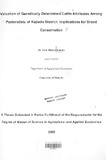| dc.description.abstract | Domestic animal diversity in developing countries is embedded in traditional farming and
pastoral communities who manage their livestock according to their indigenous knowledge and
in tune with local constraints. Especially in marginal environments, local livestock breed/rare
crucial for sustaining rural livelihoods by producing a wide range of products while requiring
relatively low levels of input with regard to fodder, management and health care. Compared with
other livestock species, cattle stand out across developing countries in terms of provision of nonmarket
services, including draught power, manure, risk management through hedging, asset
storage, community bonding, and ceremonial services, amongst others. Therefore the
maintenance of the adapted cattle breeds is ecologically more sustainable and will ensure
sustainable food and livelihood provision for communities. However, economic forces of
globalization as well as political backing for crossbreeding with exotic breed, among other
factors have already resulted in the extinction of a large number of breeds and many more are
threatened.
Kajiado district in Kenya is inhabited mainly by the Maasai pastoralist community who
are at the crossroad of socio-economic transition. It is widely recognized that the cattle they tend
represent a unique genetic resource. This study identifies attributes of the cattle breed they keep
as being specific for their purposes and unique to their production system. Consumer theory was
used in the theoretical framework of the study. The study involved the use of conjoint analysis to
identify the cattle attributes valued by the pastoral cattle producers and rank these attributes, all
of which have not been valued through the conventional market system.
Results indicate that adaptability traits, feed requirements and drought tolerance are more
valued by the pastoralist in the study area than productivity traits (milk and meat production).
That household characteristics condition the valuation of cattle attributes was evident. Presence
of off-farm income, land size owned by the household, formal education of the household head
and location of the household were critical determinants during the valuation. One implication is
that, distinguishing differences in preference between groups of respondents in connection with
specific socio-economic, agro-ecological zones and production system can be used to promote
conservation-through-use of breeds at risk of extinction. | en |

